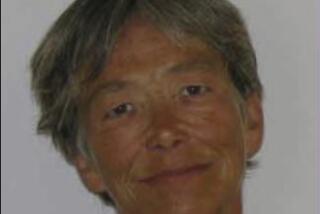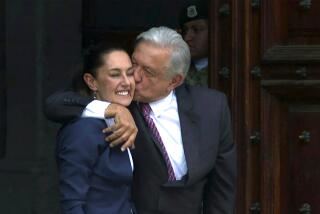Cousteau Was Willing to Stand for Principles
The influential in France tend to be a close-knit group, ready to exchange favors and slow to criticize members of the club.
So it was no surprise when, six years ago at age 81, the famed oceanographer Jacques Cousteau asked then-Paris Mayor Jacques Chirac to officiate at his wedding to Francine, his companion of more than a decade.
What was shocking--and perfectly in character for Cousteau--was the way Cousteau turned on Chirac just four years later, in 1995. Chirac, by then president of France, had ordered a six-month resumption of nuclear weapons tests in the South Pacific. Within hours, Cousteau, Chirac’s friend, took the lead in publicly condemning the president.
“Chirac is a very charming and warm person, and I like him,” Cousteau told The Times in an interview during the height of that controversy. “But, friendship or not, the thing that counts for me is to remain faithful to my ideas.”
Cousteau didn’t prevail; Chirac completed the series of tests before declaring that France would sign the test ban treaty. Cousteau blamed Chirac’s decision on a Gallic love for appearances of strength.
“President Chirac believes France must be strong. My logo is: France must be happy,” Cousteau said.
Interestingly, Cousteau had led a comprehensive study after 80 previous French tests in the South Pacific, concluding that the tests themselves caused no increase in radioactivity in the area. Still, he opposed the tests--on moral, not environmental grounds.
“The tests are designed to improve bombs and bombs are intended to kill people,” Cousteau said. “These tests are an unavowed menace to future generations.”
Cousteau’s willingness to do battle with the French president, at a time when others among France’s elite kept silent, showed that the man familiar to tens of millions around the world was a man of his principles.
Cousteau, who died Wednesday in Paris at age 87, had been, until failing health overtook him in recent months, indefatigable. On the evening The Times interviewed him, he was 85 years old, very thin and had some difficulty walking. He asked only that his interviewer speak up: “I’ve done a lot of diving so my ears are damaged a bit,” he explained.
Yet he had risen at 4:30 that morning to polish a speech he planned to give to the World Bank, spent the day editing yet another documentary and planned dinner until 11 p.m. with the director general of UNESCO. The interview at the Cousteau Society headquarters in Paris, in an expansive office filled with diving memorabilia, lasted two hours and he made no effort to cut it short.
Cousteau spent six decades traveling, diving, inventing, writing and producing films. He was fond of Los Angeles, having made numerous visits here to learn the filmmaking trade. And three of his documentaries on sea life won Academy Awards.
Yet Cousteau was impatient with tales of his success. Asked to recall his most memorable experiences, Cousteau replied: “I don’t even think about those things. When I go to the mirror in the morning, I look at my dirty face. If it looks like an honest face, I have a good day. I live day to day--for the future, not for the past.”
Similarly, he said he “couldn’t care less how I’m remembered or if I’m remembered. When life is finished, it is finished.”
Whether he would have wanted it or not, Cousteau will be remembered as the Frenchman who taught the world’s inhabitants about the world they inhabit.
“I have no particular distress about the state of the world environment,” he said. “The world has its own fate and we are part of it. Of course, it is our business to modify that fate. We must be active actors, because the greatest adventure of the universe is the human adventure.”
* END OF AN ODYSSEY: Famed undersea adventurer Jacques Cousteau dies at 87. Main story, A1
More to Read
Start your day right
Sign up for Essential California for news, features and recommendations from the L.A. Times and beyond in your inbox six days a week.
You may occasionally receive promotional content from the Los Angeles Times.







